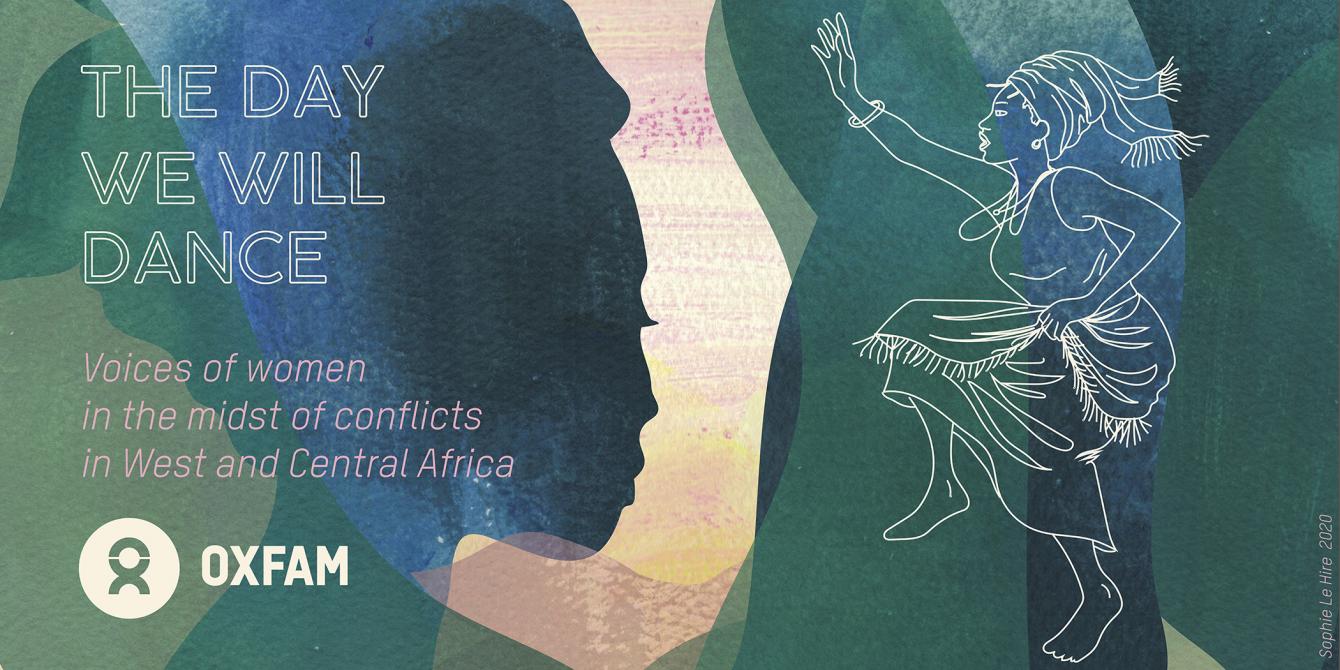The Day We Will Dance

The series The Day We Will Dance is illustrated by the artist Sophie Le Hire.
Voices of women in the midst of conflicts in the West and Central Africa
The music stopped in the heart of the desert, the savannahs and forests of the Sahel and the Central African Republic, taking with it the joy of better days. Whether in Mali, Niger, Burkina Faso or the Central African Republic, fear has spread across the region, and people are facing it at two fronts: firstly, where armed groups devastate villages, driving more than 5 million people to flee their homes in the region. Secondly – and more recent – the rise of coronavirus, which has so far affected 5,420 people and left 219 dead1, fueling fear and uncertainty amongst the population of these four countries.
And for the majority of displaced women, their dance partners have also disappeared. Many men of working age have been killed by armed groups, disappeared or have left in search of a better future to other regions, or even abroad. In Burkina Faso, women and children represented 84% of the displaced population2. Women find themselves in extremely precarious situations, struggling for their survival and for those depending on them. Many bear the scars – visible an invisible - of an act of violence, of rape. In the Central African Republic, a woman is victim of sexual and gender-based violence almost every hour.
We went to meet these Sahelian and Central African women. They are hundreds of thousands, displaced or host communities, survivors, heroines, waiting for music to resume in their lives.
Whilst they do not sing, they still have their voices. To tell their story. And hope, to imagine another future.
Discover their story
Read the story of Victorine* in Burkina Faso
“ The day I hear that this disease is over, we will dance."
*Name has been changed to protect the identity
Read the story of Mariam* in Burkina Faso
"Behind us, there are attacks, in front of us is the disease. How will we cope?"
*Name has been changed to protect the identity
Read the story of Halima in Niger
“Pregnant women kept falling and getting up. We have lost sight of our children."
Read the story of Tedy in Mali
Read the story of Sylvie in the Central African Republic
Read the story of Rosalie the Central African Republic
"The coronavirus scares me, but it's not going to last forever. I remain confident."
A series created by women
These six stories were collected by a team of female humanitarian workers at Oxfam. They are accompanied by illustrations made by the artist Sophie Le Hire, who has lived in Senegal for four years and who, in her artistic approach, proudly carries the voice of women, whom she considers as "giants". By juxtaposing two styles, she illustrates the reality of the present and the dream for the future of these women.
Discover her creative process in this video.
Oxfam's response
In the Sahel and the Central African Republic, Oxfam provides humanitarian aid and carries out advocacy actions for the populations affected by these large-scale humanitarian crises. Women and girls are the most exposed in crisis and it is fundamental that their specific needs and their protection are at the heart of humanitarian responses. Women also play a major role in developing social cohesion and building peace.
Oxfam and its local partners provide humanitarian aid to more than 400,000 internally displaced people (IDPs) and host communities in the region, in terms of food aid, access to water, hygiene and sanitation and to protect the most vulnerable, especially women and girls. Oxfam also works alongside communities in conflict transformation programs to foster cross-border dialogues and the inclusion of women and young people in the search for conflict transformation and peacebuilding.
Since the arrival of the coronavirus, Oxfam has adapted its programs to protect the poorest and most vulnerable against this new threat. We also distribute hygiene kits (soap, showers, latrines) to schools and health professionals, take action to ensure that communities have access to clean and safe water and toilets, that they are listened to and at the heart of prevention actions, in particular by understanding and adopting barrier measures.
Votre don sera traité par un autre site Web d’Oxfam. Veuillez consulter sa politique pour en savoir plus sur la manière dont vos données seront traitées.







 Suivez-nous sur Facebook
Suivez-nous sur Facebook Nos vidéos sur YouTube
Nos vidéos sur YouTube Suivez-nous sur Twitter
Suivez-nous sur Twitter